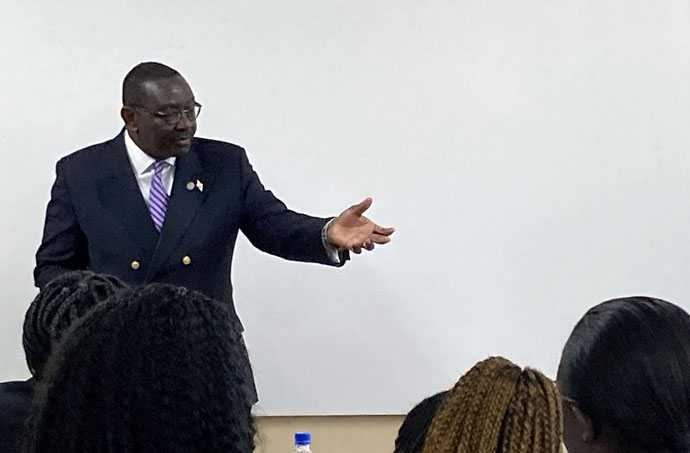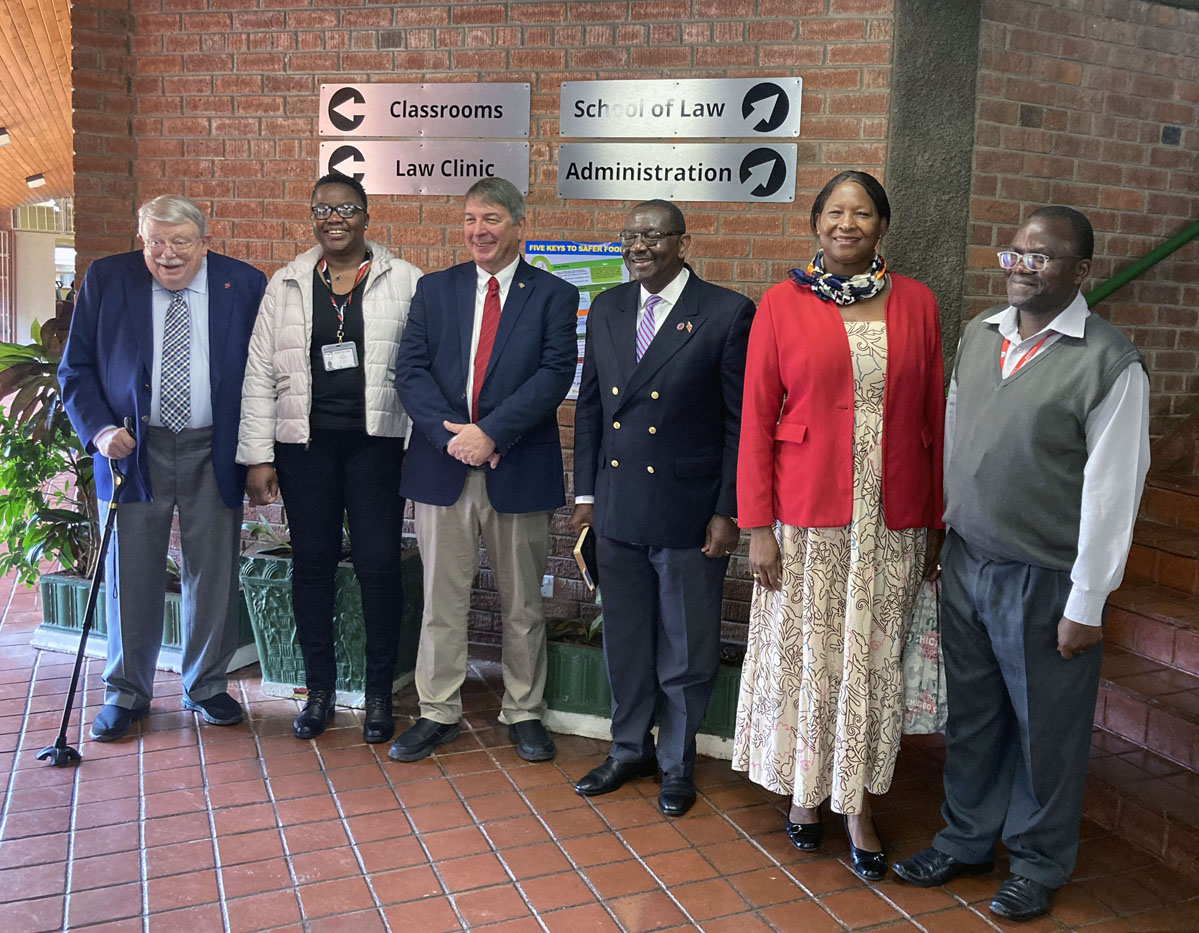Key points:
- The United Methodist Church’s top court reviewed questions stemming from a controversial church closure in North Carolina.
- The Judicial Council also released five other rulings on its six-item fall docket.
- The church court held its fall session at United Methodist-supported Africa University — the first time the Judicial Council met on the African continent.
A church’s intent to leave The United Methodist Church does not prevent that church from being closed if conditions warrant, the denomination’s top court ruled.
In Decision 1490, the Judicial Council said that no conflict exists between the denomination’s disaffiliation policy in the Book of Discipline’s Paragraph 2553 and its policy in Paragraph 2549.3(b) for a church’s closure under “exigent circumstances.”
The church court added that “until a local church is disaffiliated, the provisions of ¶2549.3(b) remain available in appropriate circumstances.”
The Judicial Council decision, addressing a controversial church closure in the North Carolina Conference, was among the six rulings the church court released Nov. 7 after its fall deliberations at Africa University.
The session at the pan-African United Methodist university was the first time the international denomination’s top court, which includes members from Liberia, Mozambique, Norway and the United States, met on the continent of Africa.
The fall meeting also likely marks the last time the Judicial Council will rule on questions related to Paragraph 2553 before that disaffiliation policy expires on Dec. 31.

For more than 200 years, The United Methodist Church and its predecessors have maintained that church property is held “in trust” for the entire denomination — meaning people could leave the denomination at any time but typically could not take church property with them.
However, after years of intensifying disputes over homosexuality, the 2019 special session of General Conference — the denomination’s top lawmaking assembly — added Paragraph 2553 to the Discipline. The provision offers U.S. congregations “a limited right” to exit the denomination with property until the end of this year, if they meet certain procedural and financial obligations.
As of Nov. 6, nearly 6,800 churches — including 326 in the North Carolina Conference — had received the necessary approvals to disaffiliate under the provision. That represents about 22% of U.S. churches withdrawing from the denomination over the past four years.
In Decision 1490, the church court reviewed rulings of law by North Carolina Conference Bishop Connie Mitchell Shelton, responding to questions related to the closure of Fifth Avenue United Methodist Church near downtown Wilmington.
At issue was whether North Carolina Conference leaders violated church law — including Paragraph 2553 — in approving an interim closure of Fifth Avenue in March after the church asked in February to hold an official vote on disaffiliation.
Bishops routinely face questions of law during the sessions at which they preside. The Discipline — the denomination’s policy book — requires that any bishop’s decision of law must go before the Judicial Council for review.
In this case, the church court affirmed Shelton’s decisions of law in response to the questions before her.
Paragraph 2549.3(b) allows conference leaders to close a church between annual conference sessions if they declare that “exigent” — that is, pressing — circumstances exist “that require immediate protection of the local church’s property, for the benefit of the denomination.” Under the provision, the conference leaders then vest the closed church’s property and assets in the annual conference board of trustees.
Annual conferences are regional bodies encompassing churches and other ministries that meet at least once a year.
In its decision, the Judicial Council noted that Paragraph 2549.3(b) has built-in safeguards. The bishop, a majority of district superintendents and the appropriate district board of church location and building all must consent to the interim closure.
The church court said that’s what happened when those North Carolina Conference leaders adopted a written “Resolution for Closure of the Fifth Avenue United Methodist Church” in March.
Paragraph 2549.3(b) and related church laws also require that the annual conference, consisting of lay and clergy voters from multiple congregations, approves the church closure when it next meets.
After three speeches for and three speeches against, a majority of North Carolina Annual Conference voters approved Fifth Avenue’s formal closure when it met in June.
“Fifth Avenue has been afforded all process that it is due under United Methodist polity,” the Judicial Council said. “The appropriate forum for a challenge to the exigent circumstances and interim closure determinations was at the meeting of the North Carolina annual conference on June 16, 2023.”
The church court added that a challenge to the closure “was in fact considered in debate but did not prevail at the annual conference.”
The Judicial Council concluded that Fifth Avenue’s interim and subsequent final closure and the vesting of the church’s property in the annual conference board of trustees did not violate church law, including Paragraph 2553.
Former members of Fifth Avenue had also sued the North Carolina Conference in civil court. In September, a Superior Court judge dismissed the lawsuit. The former members are appealing.
In addition to Decision 1490, the Judicial Council also released five other rulings stemming from its six-item fall docket.
In Memorandum 1488, the Judicial Council said it did not have jurisdiction to rule on a California-Pacific Conference matter also involving disaffiliation.
Subscribe to our
e-newsletter
During the annual conference, a clergy member made a motion seeking to have the conference board of trustees adjust its requirements for disaffiliating churches. California-Pacific Conference Bishop Dottie Escobedo-Frank ruled the clergyperson’s motion out of order. The following day, the clergy member asked for a ruling of law concerning her determination that the motion was out of order.
The Judicial Council said the clergy member’s questions concerned parliamentary procedure rather than a matter of law.
Quoting from an earlier memorandum, the church court said, the “appropriate method to challenge a parliamentary ruling by a presiding bishop” is to appeal the decision of the chair to the legislative body in which the ruling has been made.
Similarly, in Memorandum 1491, the Judicial Council said it did not have jurisdiction to rule on questions that Bishop Cynthia Moore-Koikoi ruled out of order during the Western Pennsylvania Conference’s clergy session.
The questions related to the termination of one clergyperson’s conference membership. Moore-Koikoi determined that three of the questions sought information rather than a ruling of law and that the other three questions were improper questions to ask of a bishop for a substantive ruling.
The Judicial Council said it did not review the bishop’s reasons for ruling the questions out of order “because ruling something out-of-order is a parliamentary ruling.” The church court then reiterated that parliamentary rulings can be appealed to the wider legislative body.
In Memorandum 1486, the Judicial Council also said it had no jurisdiction to review Bishop John Schol’s handling of a request in the Eastern Pennsylvania Conference to postpone a vote on a resolution because that, too, was a parliamentary ruling.
In Decision 1487, the church court affirmed Moore-Koikoi’s decision of law that another group of questions before her were not proper questions of law.
The decision dealt with questions raised during the conference’s clergy session about the dismissal of a complaint against a clergy member. Two questions asked for information and two others asked the bishop to rule on the procedure for dismissing the complaint, including if a provision in the Discipline is in line with the denomination’s constitution.
Requests for information are not questions of law, the Judicial Council said. A bishop also may not rule on the constitutionality of a provision in the Book of Discipline.
“Further,” the church court added, “questions which are procedural or substantive matters relating to actions in a judicial or administrative process are not proper questions to be addressed in a substantive ruling by a bishop.”
In Decision 1489, the Judicial Council affirmed Upper New York Conference Bishop Héctor Antonio Burgos-Núñez’s decision of law. The bishop dismissed a question as moot and hypothetical because it dealt with the original text of a resolution that subsequently had been amended by substitution.
The original resolution sought to use unrestricted dollars from three funds, including from the conference pension/health fund, to pay the conference’s portion of the Boy Scouts settlement among other obligations.
However, the version of the resolution the conference ultimately approved directed the conference leadership team to instead study every feasible funding source and report back to next year’s annual conference. The revised resolution also said the leadership team must track the sources of any funds spent in the year ahead so the annual conference could restore those funds.
The question about the original resolution’s use of pension and health funds came too late in this case, the Judicial Council said.
“The matter had moved on and the only question before the house at that point was the substitute motion,” the church court said. “The question was therefore irrelevant …”
During the fall session, Deanell Tacha and the Rev. Luan-Vu Tran were absent. Kent Fulton, first lay alternate, and the Rev. Timothy Bruster, first clergy alternate, participated in the rulings.
Hahn is assistant news editor for UM News. Contact her at (615) 742-5470 or newsdesk@umcom.org. To read more United Methodist news, subscribe to the free Daily or Friday Digests.



